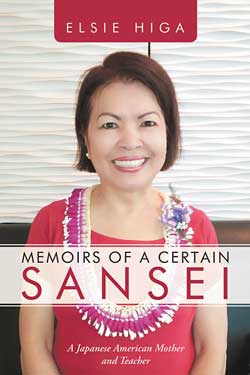Confessions Of A Teacher and Parent
Two of the most challenging yet rewarding tasks in society are being a teacher and a mother. Now there is a book, Memoirs Of A Sansei, authored by Elsie Higa that calls attention to the importance of parenting and teaching. Higa — a third-generation Japanese-American who has been teaching at Iolani School for more than 40 years, draws upon her experience in education, coupled with her parental insights and guidance for raising three children, to dispense some sagacious advice and wisdom that families of all ages and ethnic backgrounds would find most useful.
“This book (her second) is simply a way of fulfilling my responsibility as a parent and a teacher,” Higa says. “If it can help even one family, I will feel honored.”
Knowing a little bit about Iolani from a former student, coach, teacher and board member perspective, I can attest to Sensei Higa’s reputation of being one of the best Japanese language teachers and cultural experts that the school and, I dare say, the state has ever enjoyed.

‘Memoirs of a Certain Sansei’ cover PHOTO COURTESY ELSIE HIGA
Her style is quite interesting, as she shares anecdotes and short stories from her children and former students regarding their relationship with her, and she in turn opines and elaborates with her personal thoughts and reflections. In her remembrances about her K-12 teachers, she cites positive examples as well as negative incidents that have helped shape her philosophy as a teacher. (I thought I was the only person who could spin a yarn or two about every teacher I had from grade school to high school.) Her overarching objective as a teacher is to “instill in them a lifelong love of learning. Students may be poor language learners in high school, but (can) still enjoy the culture and the process of learning … If students acquire a love of learning they will thrive … in other aspects of their lives.”
Higa has compiled an impressive collection of statements, some of them end-ofthe- year course evaluations penned by former students. Everything from her emphasis on creating a “comfortable, colorful and inviting” classroom atmosphere to her insistence on making her classroom a “home away from home,” that had her students feel that their Japanese class was “like another family to me,” to her “stern yet caring” approach was lauded by her former pupils. She has a practice of using the batsu bako, referred to as a penalty box, where breaking of classroom rules were compiled, and it was viewed as a compassionate form of discipline. When a student gets up to three penalties, he or she is assigned detention work.
She is someone they clearly trust and respect, because she is “fair” and “treats everyone equally every day.” It is evidently clear that what endears Sensei to her students throughout her four decades of teaching is her infectious smile and positive upbeat characteristics — in particular, her energy, enthusiasm, patience and understanding.
The ultimate compliment for Higa comes from a former student, who writes, “Sensei was a karui (sunshine bright), genki (energetic), tanoshii (fun) and kibishii (strict) sensei … Her help in the classroom and outside has positively impacted my college education, my career, my family and friends. She has been a catalyst in my life.”
Every administrator, instructor or coach I know cherishes hearing similar types of feedback from their former students or players. When it is all said and done, teaching and mentoring are all about developing future leaders in our community. In the limited time that I spent in an adult supervisory position in the classroom and on the basketball court, I am always humbled to hear Peter Ho, Bank of Hawaii chairman, president and CEO, and Neil “Dutch” Kuyper, president and CEO of Parker Ranch, reminisce positively of the time I had with them as their teacher when they were middle-school students at Iolani. The incredible quantity and quality of Sensei Higa’s student responses has me awestruck, to say the least.





